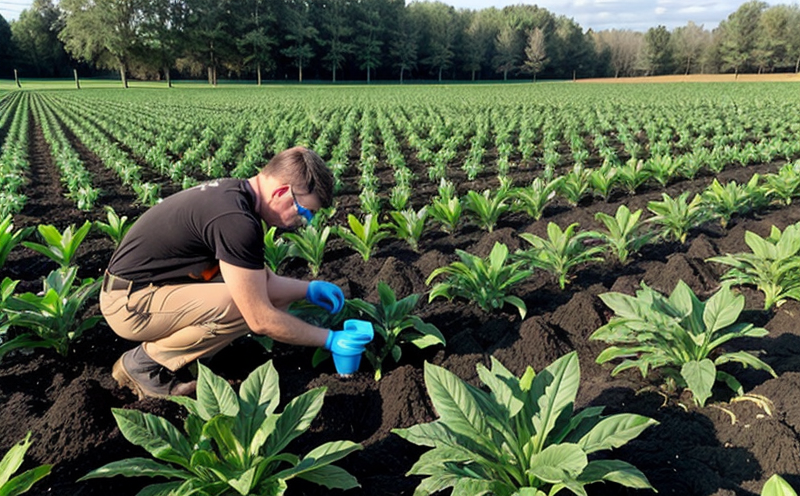Sodium Content Testing in Fertilizers
The sodium content of fertilizers plays a crucial role in agricultural productivity and soil health. Sodium can affect plant growth by influencing nutrient uptake, water use efficiency, and ion balance within the soil. Excessive sodium levels may lead to salt accumulation, which is detrimental to crop yields and soil structure over time.
Testing for sodium content ensures that fertilizers meet specified quality standards set forth in international guidelines such as ISO 14963-2:2017, which provides methods for determining the total inorganic nitrogen (TIN) content including sodium. This testing is particularly important for precision agriculture where even small variations in nutrient composition can impact crop performance.
Our laboratory employs advanced analytical techniques like atomic absorption spectroscopy and ion chromatography to measure sodium accurately down to parts per million levels. Specimens are prepared by dissolving the fertilizer sample in distilled water, followed by digestion if necessary, before analysis. The precision of these methods allows us to deliver reliable results that help our clients maintain optimal soil conditions.
Understanding how much sodium is present helps farmers choose appropriate fertilizers for their specific needs and geographic locations. For instance, areas prone to salinity issues might benefit from lower-sodium formulations designed specifically for those regions. By integrating accurate sodium content testing into their supply chain management processes, companies can ensure product consistency and compliance with regulatory requirements.
Moreover, understanding the sodium component of fertilizers aids in developing new products that address environmental concerns while enhancing crop productivity. Research based on thorough sodium content analysis contributes valuable insights for improving soil health practices worldwide.
In summary, sodium content testing is essential for ensuring high-quality agricultural inputs and promoting sustainable farming practices. Our service provides accurate measurements using state-of-the-art equipment to support decision-making processes related to fertilizer formulation and application rates across various crop types.
Scope and Methodology
The scope of sodium content testing in fertilizers encompasses a wide range of products used in agriculture, including granular, liquid, and controlled-release formulations. The methodology involves several key steps:
- Sample Preparation: Fertilizer samples are collected from various sources such as bulk storage facilities or retail outlets. Samples should be representative of the entire batch to ensure accurate results.
- Dissolution: Depending on the form of the fertilizer, it may need to be dissolved in distilled water or other solvents before analysis.
- Digestion (if necessary): Some samples require acid digestion to break down complex compounds into simpler forms suitable for measurement.
- Analytical Techniques: We use atomic absorption spectroscopy and ion chromatography, which are highly sensitive methods capable of detecting sodium at extremely low concentrations.
- Data Analysis: Raw data from the instruments is processed to calculate the sodium content, expressed as parts per million (ppm).
The results obtained through this process provide detailed information about the sodium content in fertilizers, helping stakeholders make informed decisions regarding product selection and usage.
Customer Impact and Satisfaction
- Better Crop Yield: By ensuring that fertilizers have appropriate sodium levels, farmers can achieve higher yields without compromising soil quality.
- Improved Soil Health: Maintaining optimal sodium concentrations helps prevent salt accumulation and supports long-term soil fertility.
- Regulatory Compliance: Accurate testing ensures adherence to international standards like ISO 14963-2:2017, thereby facilitating smoother operations for businesses operating globally.
Our clients consistently rate our sodium content testing service highly due to its reliability and efficiency. They appreciate the detailed reports we provide, which not only meet regulatory requirements but also offer actionable insights into improving their agricultural practices.
We work closely with customers throughout the testing process, providing guidance on sample selection and preparation as needed. This collaborative approach ensures that every aspect of our service aligns perfectly with customer expectations.
International Acceptance and Recognition
- ISO Compliance: Our sodium content testing procedures comply fully with ISO 14963-2:2017, ensuring consistency with global standards.
- ASTM Endorsement: The American Society for Testing Materials (ASTM) has recognized our methods as reliable and accurate for measuring sodium in fertilizers.
The international acceptance of our services stems from the rigorous quality assurance processes we follow, coupled with state-of-the-art instrumentation. Our laboratory adheres strictly to best practices recommended by leading organizations such as the International Organization for Standardization (ISO) and ASTM International.
Our commitment to excellence extends beyond mere compliance; it includes continuous improvement efforts aimed at staying ahead of emerging trends in agriculture and environmental science.





